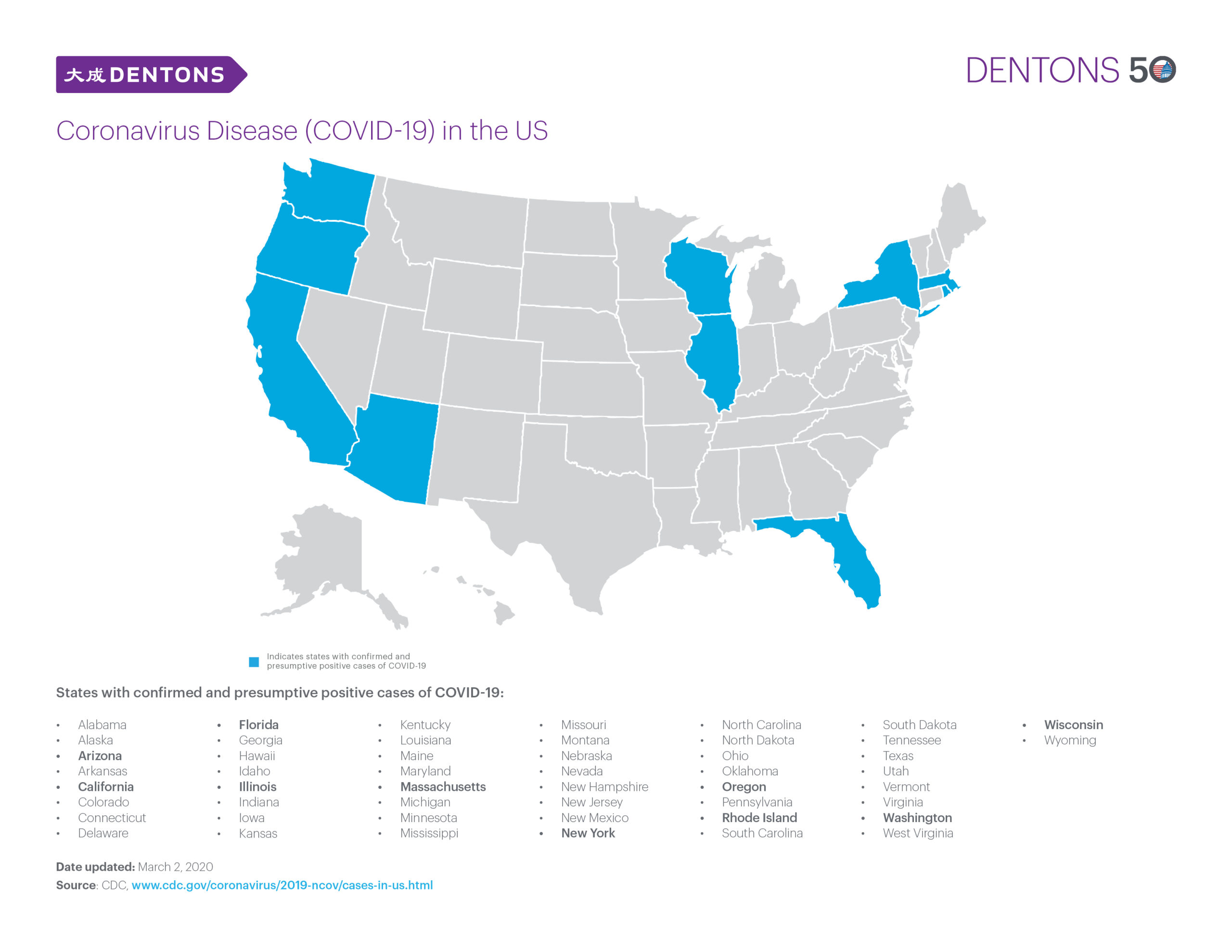
SUMMARY:
As of Monday, March 2, there have been 43 total cases of the COVID-19 virus, commonly known as the coronavirus, in the US. Ten states have confirmed cases: Washington, Oregon, California, Arizona, Wisconsin, Illinois, Florida, New York, Massachusetts and Rhode Island. According to the Center for Disease Control 17 of the 43 cases are travel-related and 26 are the result of person-to-person spread.
President Trump tasked Vice President Mike Pence with overseeing the federal effort to combat the virus. Pence is leading the federal coronavirus task force alongside the new coronavirus response coordinator Dr. Deborah L. Birx and Secretary of Health and Human Services Alex M. Azar II.
While the federal government is seeking funding for test kits and coordinating best practices, the administration has left significant responsibility in the hands of governors. This weekly update will provide relevant information on the spread of, and government responses to, the coronavirus, as well as links to all state health websites.
Alabama:
Alaska:
Arizona:
Governor Doug Ducey and Arizona health officials will be giving a public update on Monday, March 2, about the status of coronavirus in the state. Gov. Ducey will be joined by Director of the Arizona Department of Health Services Dr. Cara Christ, Director of the Division of Emergency Management Wendy Smith-Reeve and Director of Arizona Health Care Cost Containment System Jami Snyder.
Dr. Christ said previously that public health may begin working with community and business leaders to encourage social distancing, teleworking, and reducing or canceling large gatherings of people.
Arkansas:
California:
California has confirmed coronavirus cases in several counties. Last Thursday, February 27, Governor Gavin Newsom said the state is monitoring about 8,400 people for the coronavirus. The Governor said the state also currently has a shortage of coronavirus testing kits and is working with the US Centers for Disease Control and Prevention to update the testing protocols for the coronavirus.
Several of the affected counties have declared a state of emergency.
Colorado:
Connecticut:
To date, there have been no confirmed cases of the coronavirus in Connecticut. Governor Ned Lamont and his administration are working closely with the federal government, hospitals, municipal health departments, and educational institutions to prepare for a potential outbreak.
Department of Public Health Commissioner Renée D. Coleman-Mitchell has taken the lead on behalf of the administration to develop a plan for a coordinated response. On Friday, February 28, the department’s laboratory received CDC approval to conduct diagnostic testing for the virus. The approval will allow physicians to act faster in their efforts to diagnose and contain the virus.
Delaware:
Florida:
After two Floridians tested “presumptively positive” for coronavirus, Governor Ron DeSantis declared a public health emergency in the state and appointed the Florida Department of Health to lead the response.
The governor is holding press conferences in Tampa and Miami on Monday, March 2, to discuss the state’s response to the coronavirus.
Georgia:
Georgia, home to the CDC, does not have any confirmed cases of coronavirus. Nonetheless, Governor Brian Kemp has appointed a task force to oversee preparations for a potential outbreak. Kemp announced the 18-member task force on Friday, February 28. Some task force members include Georgia Emergency Management and Homeland Security Director Homer Bryson; state Department of Public Health epidemiologist Cherie Drenzek; Emory University Clinical Virology Research Laboratory Director Colleen Kraft; and Hartsfield-Jackson International Airport General Manager John Selden.
Hawai`i :
According to the Department of Health, there have been no reported cases of coronavirus, or COVID-19, in Hawai`i but the department continues “to monitor the situation closely.”
Governor David Ige has made an emergency request to the Hawai`i State Legislature for $7.2 million to fight a possible outbreak. The Hawaii Senate Ways and Means Committee on Thursday, February 27, agreed to appropriate about $10.5 million to the Department of Health and other state agencies to deal with an outbreak should it occur.
Idaho:
- Idaho state department of health: coronavirus (no coronavirus info on main page)
- Local health departments in Idaho
Illinois:
- Illinois state department of health: coronavirus
- Local health departments in Illinois
- Information for schools (K-12) and students
Illinois health officials have requested that the CDC send a team to the state to support their containment efforts. Illinois currently has three confirmed cases and 76 persons under investigation.
Indiana:
The Indiana State Department of Health (ISDH) is urging citizens to take common-sense steps to prepare for the possibility that the novel coronavirus (COVID-19) gains a greater foothold in the US.
Indiana has no confirmed cases of COVID-19, and no one in the state is suspected of being infected at this time. However, 26 residents are being monitored due to their history of travel or contact with an individual who has traveled to an affected country.
ISDH is working with state, local and federal partners to refine existing pandemic response strategies, which include specific measures to prepare communities to respond to local transmission of the virus.
Iowa:
Kansas:
Kentucky:
Louisiana:
Maine:
Maryland:
Massachusetts:
As of Monday, March 2, there is one confirmed case of coronavirus in Massachusetts. The state health website asserts that risk to residents remains low. The Massachusetts Department of Public Health is working closely with the CDC to provide updated information as it becomes available.
Michigan:
- Michigan state department of health: (No coronavirus page yet)
- Local health departments in Michigan
Minnesota:
On Monday, March 2, Senator Jerry Relph (R-St. Cloud) introduced SF 3813 which would dedicate $5 million to the Commissioner of Health for planning and preparation related to potential outbreak of SARS-CoV-2 virus and COVID-19.
The bill was referred immediately to the state Senate’s Finance Committee, bypassing all other health-related policy and finance committees. The bill has been fast-tracked and will be heard in the Finance Committee on Wednesday, March 4. The Finance Committee will also hear a presentation and update from the state Department of Health on COVID-19. It appears the state Senate may pass the bill out of the chamber on Thursday, March 5.
Mississippi:
Missouri:
- Missouri state department of health: (No coronavirus page yet)
- Local health departments in Missouri
Montana:
Nebraska:
Nevada
- Nevada state department of health: coronavirus
- Southern Nevada Health District
- Washoe County Health District
- Carson City Health and Human Services
New Hampshire:
New Jersey:
New Mexico:
New York:
New York reported its first case of the coronavirus over the weekend. The infected individual is isolated in her home and is not in serious condition. Governor Andrew Cuomo said the risk remains low in New York and that the challenge is containment. He said he expects more cases to be revealed as testing becomes more widespread.
North Carolina:
North Dakota:
Ohio:
Oklahoma:
Oregon:
Oregon currently has two patients with presumptive coronavirus. One of the two patients was an employee of Forest Hills Elementary school, which is now closed through at least Thursday.
The state is monitoring the health of 86 people who are asymptomatic but may have been exposed.
Pennsylvania:
Rhode Island:
The Rhode Island Department of Health announced Sunday that a teenage girl has tested positive for coronavirus, the second presumptive case in the state. A third resident is currently under investigation.
Earlier Sunday, Gov. Gina Raimondo and Health Department Director Dr. Nicole Alexander-Scott held a news conference at the Health Department’s headquarters in Providence to address the global epidemic’s arrival in Rhode Island. They emphasized that the risk to most residents was “very low.”
South Carolina:
South Dakota:
Tennessee:
Tennessee does not have any cases of COVID-19 at this time. However, the state government is taking steps to prepare for an outbreak should the virus reach Tennessee. Governor Bill Lee and emergency teams met this week to further coordinate a response plan.
Texas:
Utah:
Vermont:
Virginia:
- Virginia state department of health: coronavirus
- Local health departments in Virginia
- Virginia public school districts (contacts available)
Washington:
- Washington state department of health: coronavirus
- Local health departments in Washington
- (Great resource: Seattle department of health: coronavirus)
The nation’s two known deaths from coronavirus both occurred in Washington State. On Saturday Governor Jay Inslee declared a state of emergency in response to new cases of COVID-19, directing state agencies to use all resources necessary to prepare for and respond to the outbreak.
The Governor’s proclamation directs state agencies and departments to utilize state resources and do everything reasonably possible to assist affected communities responding to and recovering from COVID-19 cases. It also allows the use of the Washington National Guard, if necessary. In January the Washington Military Department activated the State Emergency Operations Center at a Level 1, the highest level, to help coordinate a statewide response.
West Virginia:
Wisconsin:
The only person in Wisconsin sickened with coronavirus has been confirmed healthy and released from isolation, according to Public Health Madison & Dane County. Karri Bartlett, community health supervisor with Public Health Madison & Dane County, said that medical officials tested the patient for coronavirus every other day for two weeks. The patient had been isolated at home since Jan. 30, and authorities announced the person had coronavirus on February 5.

